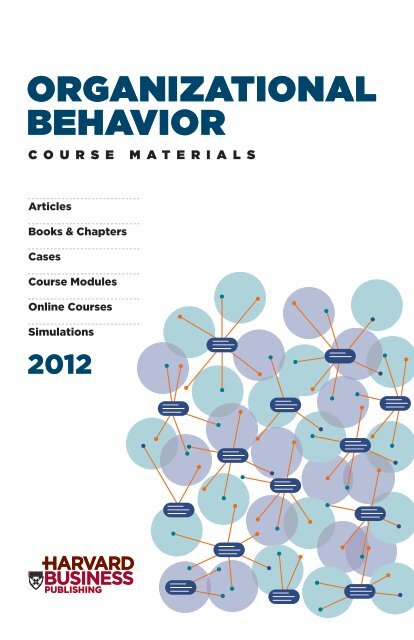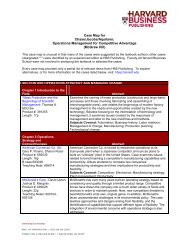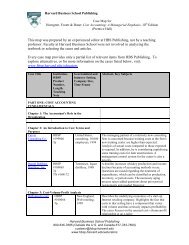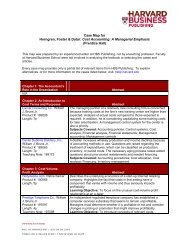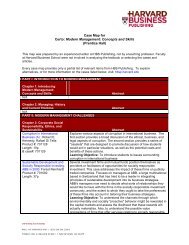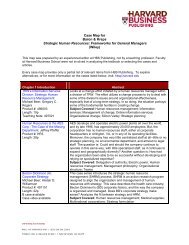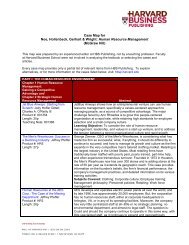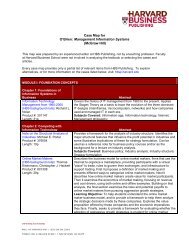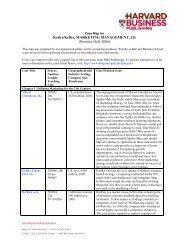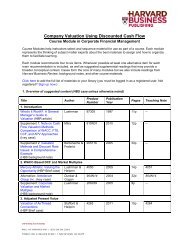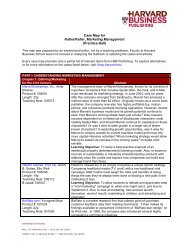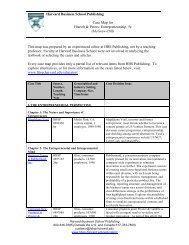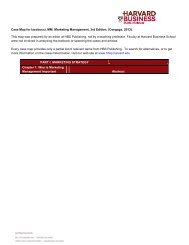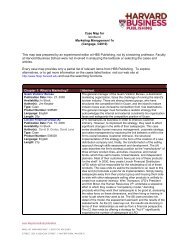ORGANIZATIONAL BEHAVIOR - Harvard Business School Press
ORGANIZATIONAL BEHAVIOR - Harvard Business School Press
ORGANIZATIONAL BEHAVIOR - Harvard Business School Press
Create successful ePaper yourself
Turn your PDF publications into a flip-book with our unique Google optimized e-Paper software.
<strong>ORGANIZATIONAL</strong><br />
<strong>BEHAVIOR</strong><br />
COURSE MATERIALS<br />
Articles<br />
Books & Chapters<br />
Cases<br />
Course Modules<br />
Online Courses<br />
Simulations<br />
2012
<strong>Harvard</strong> <strong>Business</strong> Publishing<br />
serves the finest learning<br />
institutions worldwide with<br />
a comprehensive catalog of<br />
case studies, journal articles,<br />
books, and eLearning programs,<br />
including online courses and<br />
simulations. In addition to<br />
material from <strong>Harvard</strong> <strong>Business</strong><br />
<strong>School</strong> and <strong>Harvard</strong> <strong>Business</strong><br />
Review, we also offer course<br />
material from these renowned<br />
institutions and publications:<br />
Babson College<br />
<strong>Business</strong> Enterprise Trust<br />
<strong>Business</strong> Expert <strong>Press</strong><br />
<strong>Business</strong> Horizons Magazine<br />
California Management Review<br />
Darden <strong>School</strong> of <strong>Business</strong><br />
Design Management Institute<br />
HEC Montréal Centre for Case Studies<br />
IESE <strong>Business</strong> <strong>School</strong><br />
INSEAD<br />
International Institute for Management<br />
Development (IMD)<br />
Ivey <strong>School</strong> of <strong>Business</strong><br />
John F. Kennedy <strong>School</strong> of Government<br />
Kellogg <strong>School</strong> of Management<br />
Perseus Books<br />
Princeton University <strong>Press</strong><br />
Rotman Magazine<br />
Sloan Management Review<br />
Social Enterprise Knowledge Network<br />
Stanford Graduate <strong>School</strong> of <strong>Business</strong><br />
Thunderbird <strong>School</strong> of Global<br />
Management<br />
Tsinghua University<br />
University of Hong Kong<br />
Customer service is available 8 am to 6 pm ET, Monday through Friday.<br />
Phone: 1-800-545-7685 (1-617-783-7600 outside the U.S. and Canada)<br />
Tech support is available 8 am to 8 pm ET, Monday through Thursday,<br />
8 am to 7 pm ET, Friday.<br />
Phone: 1-800-810-8858 (1-617-783-7700 outside the U.S. and Canada)<br />
Email: custserv@hbsp.harvard.edu<br />
Web: hbsp.harvard.edu
CASES<br />
Cases, slices of business life, focus on actual problems and decisions facing a company.<br />
Students are challenged to put themselves in the protagonist’s place and suggest<br />
business strategies, tactics, and solutions.<br />
New Cases<br />
Children’s Hospital Boston (A)<br />
Five-year old Matty tragically dies at Children’s Hospital Boston after having elective<br />
neurosurgery to cure his epilepsy. Confused leadership, organizational differentiation,<br />
structurally induced silence, and organizational misalignment are identified as contributing<br />
factors in his death. If the organizational system of the hospital and not the surgery<br />
has failed, can the staff at Children’s Hospital Boston deeply examine the system and<br />
themselves in order to make significant changes? <strong>Harvard</strong> <strong>Business</strong> <strong>School</strong> #411041<br />
Dr. Amita Joshi at Samuel Drugs Limited<br />
Dr. Amita Joshi places rising star Rajesh Mishra in charge of improving her marketing<br />
operation. Mishra is soon promoted to managing director, placing the subordinate in a peer<br />
role with his boss, Joshi. This creates conflict between the two and structural responses as<br />
well as behavioral response are needed. Ivey <strong>School</strong> of <strong>Business</strong> Foundation #W11007<br />
Innovation and Growth at Actelion Ltd.<br />
Swiss firm Actelion has grown from a small group of four with an innovative spirit to one of<br />
Europe’s largest biotechs. The bulk of its success has been from the drug Tracleer but with<br />
its patent due to expire, the company is under increasing pressure from investors to come<br />
up with a new discovery. The case follows the Actelion CEO as he struggles to maintain the<br />
entrepreneurial culture he finds crucial for innovation in an evolving company of over 2000<br />
employees. <strong>Harvard</strong> <strong>Business</strong> <strong>School</strong> #611065<br />
OPOWER: Increasing Energy Efficiency through Normative Influence<br />
Wildly successful after only three years, OPOWER is an energy-efficiency and Smart Grid<br />
software company that uses Cialdini’s principles of social influence to encourage energyuse<br />
reduction. OPOWER founders Dan Yates and Alex Laskey are considering whether their<br />
behavioral-science approach to energy efficiency could produce even better results with<br />
the upcoming second release of the software. <strong>Harvard</strong> <strong>Business</strong> <strong>School</strong> #911016<br />
Rebecca S. Halstead: Steadfast Leadership<br />
This case reviews Rebecca Halstead’s meteoric rise from cadet to Brigadier General in the<br />
U.S. Army. Halstead contends with the unique challenges faced by women in the military,<br />
turns around a troubled military unit, and deals with a difficult boss who once threatened<br />
her command of a 25,000-person combat mission. Students examine how Halstead<br />
developed into a successful leader through her personal attributes, skills, and organizational<br />
practices. <strong>Harvard</strong> <strong>Business</strong> <strong>School</strong> #411050<br />
Shar Matin (A)<br />
Shar Matin is the managing director of Spectranetics International, the European subsidiary<br />
of a U.S. medical device company. Over the past three months, Matin has reorganized the<br />
organizational structure of Spectanetics and has created a plan to change the business<br />
model as part of an aggressive European growth strategy. Matin must pitch this plan to the<br />
CEO for further acceptance but he faces the prospect of doing so without the support of<br />
the CFO. <strong>Harvard</strong> <strong>Business</strong> <strong>School</strong> #411082<br />
HBSP.HARVARD.EDU 1
Popular Cases<br />
Army Crew Team<br />
Using objective, individual performance data, the coach of West Point’s crew team has put<br />
his top eight rowers in his first crew and the second tier of rowers on his second team. But<br />
to his bewilderment, the second boat continually beats the first in races. This case follows<br />
the coach as he attempts to determine the team dynamics causing these unexpected<br />
results. Revised in 2004. <strong>Harvard</strong> <strong>Business</strong> <strong>School</strong> #403131<br />
Charlotte Beers at Ogilvy & Mather Worldwide (A)<br />
Charlotte Beers takes on leadership of Ogilvy & Mather Worldwide during a period of rapid<br />
industry change and organizational crisis. Sixteen months later, turnaround has begun but<br />
organizational structures and systems are not yet aligned with the firm’s new direction.<br />
Beers must decide how to move forward with her senior team. Revised in 1999.<br />
<strong>Harvard</strong> <strong>Business</strong> <strong>School</strong> #495031<br />
Coach K: A Matter of Heart<br />
Mike Krzyzewski, a successful college basketball coach at Duke University, has been offered<br />
a job coaching a professional NBA team. The case explores various coaching styles as<br />
he decides whether to stay at the collegiate level or move on. Various styles of power,<br />
influence, and persuasion are discussed and students learn that different situations and<br />
personalities call for different leadership styles. Revised in 2005.<br />
<strong>Harvard</strong> <strong>Business</strong> <strong>School</strong> #406044<br />
Erik Peterson (A)<br />
Describes the problems facing a recent MBA graduate in his job as general manager of<br />
a mobile cellular company owned by a parent corporation. Raises issues of corporate<br />
divisional relationships and the difficulties facing an inexperienced manager who seems to<br />
be receiving little support. Revised in 1995. <strong>Harvard</strong> <strong>Business</strong> <strong>School</strong> #494005<br />
Mount Everest—1996<br />
Describes the events that transpired during the May 1996 Mount Everest tragedy and<br />
examines the flawed decisions that climbing teams made before and during the ascent.<br />
Covers group dynamics and behavior, crisis communication, and crisis-influenced<br />
teamwork. Revised in 2003. <strong>Harvard</strong> <strong>Business</strong> <strong>School</strong> #303061<br />
Peter Browning and Continental White Cap (A)<br />
Presents a new VP’s entry into a well-established manufacturing organization that is<br />
facing an impending competitive crisis. Demonstrates his efforts to make changes in<br />
the organization’s culture in order to better position it to face the crisis. Also includes<br />
several complex choices he must make as he considers whether to replace some key but<br />
problematic senior managers. Revised in 2000. <strong>Harvard</strong> <strong>Business</strong> <strong>School</strong> #486090<br />
Rob Parson at Morgan Stanley (A)<br />
Rob Parson, a star producer in Morgan Stanley’s Capital Markets division, has generated<br />
substantial revenues since being recruited from a competitor the prior year. But his<br />
performance evaluation reveals that he is having difficulty adapting to the firm’s culture.<br />
His manager, Paul Nasr, must decide whether to promote Parson to managing director.<br />
Revised in 1998. <strong>Harvard</strong> <strong>Business</strong> <strong>School</strong> #498054<br />
2 <strong>ORGANIZATIONAL</strong> <strong>BEHAVIOR</strong> • 2012
Wolfgang Keller at Konigsbrau-TAK (A)<br />
Wolfgang Keller faces a managerial dilemma. His subordinate, Dmitri Brodsky, is a talented<br />
and experienced commercial director who is not meeting his goals quickly enough and<br />
whose style is causing conflict with clients, with other staff members, and with Keller<br />
himself. What is the best course of action to take with this difficult employee? Revised in<br />
2008. <strong>Harvard</strong> <strong>Business</strong> <strong>School</strong> #498045<br />
BRIEF CASES<br />
Rigorous and compact, Brief Cases from <strong>Harvard</strong> <strong>Business</strong> Publishing present realistic<br />
management challenges for students to discuss.<br />
Campbell and Bailyn’s Boston Office: Managing the Reorganization<br />
Competitive pressures drive organizational changes at a securities brokerage firm, with<br />
serious potential consequences for customers, employees, and the firm as a whole. #2182<br />
NEW! Kay Sunderland: Making the Grade at Attain Learning<br />
An account director is surprised to find out that a talented colleague is jeopardizing an<br />
important account by ignoring Attain’s communications policy. She must decide how to<br />
handle the delicate situation not only with the client but also with her peer. #4289<br />
NEW! Jamie Turner at MLI, Inc.<br />
A 32-year-old MBA graduate is hired to revive an industrial lighting distributor. He and his<br />
new boss have very different assumptions and expectations, and an interpersonal mismatch<br />
begins to evolve. How will they both navigate this difficult situation? #4254<br />
MediSys Corp.: The IntensCare Product Development Team<br />
A medical equipment manufacturer develops an innovative system for monitoring intensive<br />
care patients. Six months into the project, the product development team struggles with<br />
design problems, schedule, competitive threats, and group dynamics. #4059<br />
RL Wolfe: Implementing Self-Directed Teams<br />
A plastics manufacturer introduces the concept of self-directed teams (SDTs) to its Corpus<br />
Christi plant in 2004. By 2007, Corpus Christi is outperforming the firm’s other plants and<br />
the production director seeks to understand the nature of SDTs and whether the other<br />
plants might be persuaded to accept them. #4063<br />
Stone Finch, Inc.: Young Division, Old Division<br />
To stimulate innovation and hasten growth in a young technology solutions division,<br />
an aggressive CEO milks the firm’s cash cow, an old manufacturing unit. That unit soon<br />
faces key employee departures and sinking morale—and the newer unit runs into similar<br />
difficulties. #3214<br />
TerraCog Global Positioning Systems: Conflict and Communication on Project Aerial<br />
When a new product launch is threatened by cost problems, the firm’s units are unable to<br />
come together to make a critical decision and a young executive must lead them forward.<br />
#2184<br />
Treadway Tire Company: Job Dissatisfaction and High Turnover at the Lima Plant<br />
Line supervisors at a manufacturing plant are caught in the middle of an adversarial<br />
relationship between workers and management. #2189<br />
HBSP.HARVARD.EDU 3
MULTIMEDIA CASES<br />
Multimedia cases put students in the center of business dilemmas by bringing concepts<br />
to life with animated charts, audio, and video segments. Available on CD-ROM and PC.<br />
NEW! Leadership, Culture, and Transition at lululemon<br />
Highlights the fundamental tensions that entrepreneurial companies and their leaders face<br />
when going to scale: balancing rapid growth with the need to leverage their organizational<br />
architecture and culture as the firm evolves. #410705<br />
Burt’s Bees: Balancing Growth and Sustainability<br />
Through video segments that detail Burt’s Bees’ transition from small rural Maine shop<br />
to acquisition by the Clorox Company, students learn about the leadership challenges of<br />
balancing sustainable business practices with fiscal growth objectives. #410704<br />
Columbia’s Final Mission<br />
Chronicles Columbia’s final mission from the perspective of six key managers and engineers<br />
associated with NASA’s Space Shuttle program to give students an understanding of crisis<br />
management, organizational decision-making, and failure prevention. #305032<br />
Æ Find more cases, Brief Cases, and multimedia cases at hbsp.harvard.edu<br />
ROLE PLAYS<br />
Role Plays help students develop their decision-making skills by setting up realistic<br />
business challenges that require students to use negotiation techniques to work<br />
out the best possible solutions. Each Role Play is accompanied by a comprehensive<br />
Teaching Note.<br />
Necessary Evils<br />
Firing people, laying people off, delivering bad news or negative performance feedback—<br />
all are necessary evils that emerging leaders must prepare for. This Role Play takes students<br />
through a series of introspective questions, punctuated by small group discussions and<br />
concluding with a large group discussion of insights. #404027<br />
Æ Find more Role Plays at hbsp.harvard.edu<br />
COURSE MODULES<br />
Course Modules offer a road map to the best teaching materials, with recommendations<br />
on how to organize them. Each module suggests 4–6 items plus alternate suggestions.<br />
Popular modules in Organizational Behavior include:<br />
Interpersonal Relations<br />
Organizational Change<br />
Teams and Groups<br />
Æ Find more Course Modules at hbsp.harvard.edu<br />
4 <strong>ORGANIZATIONAL</strong> <strong>BEHAVIOR</strong> • 2012
ARTICLES<br />
Articles from <strong>Harvard</strong> <strong>Business</strong> Review and other renowned journals provide up-to-the<br />
minute ideas from the best business thinkers.<br />
New Articles<br />
Are You a Good Boss—or a Great One?<br />
In this article, Linda Hill and executive Kent Lineback share their observation that most<br />
managers reach a level of proficiency and stay there regardless of further potential. They<br />
offer three imperatives to avoid this trap: manage yourself: who you are as a person, your<br />
beliefs and values, and how you connect with others; manage your network: build and<br />
nurture relationships; and manage your team: inform teams of expectations and goals.<br />
A useful self-assessment tool is also provided. <strong>Harvard</strong> <strong>Business</strong> Review #R1101K<br />
The Power of Small Wins<br />
In an analysis of knowledge workers’ diaries, the authors of this article found that the<br />
largest contributor to a more positive inner work life is making progress in meaningful work.<br />
This progress principle suggests that managers have more influence than they may realize<br />
over employees’ well-being, motivation, and creative output. The authors describe how to<br />
learn which actions support progress and provide a daily checklist for monitoring progressenhancing<br />
behaviors. <strong>Harvard</strong> <strong>Business</strong> Review #R1105C<br />
Silenced by Fear: The Nature and Consequences of Fear at Work<br />
The authors of this article propose that the most significant result of fear at work is silence<br />
on the part of employees. They describe four types of silence that affect productivity and<br />
innovation across industries: Non-Deliberative Defensive Silence, Schema-Driven Defensive<br />
Silence, Deliberative Defensive Silence and offer a new one—Habituated Silence. The<br />
concept of “voice efficacy” is then offered as a means to mitigate the debilitating effects of<br />
silence. Rotman <strong>School</strong> of Management #ROT138<br />
Strategies for Learning from Failure<br />
In this article, Amy Edmonson contradicts the common belief that taking an understanding<br />
stance on failure will create an “anything goes” work environment. She states that failure<br />
is inevitable and it is not as easy to learn from as we think. Students learn that strong<br />
leadership can build a learning culture in which large and small failures are consistently<br />
reported and deeply analyzed, and opportunities to experiment are proactively sought.<br />
<strong>Harvard</strong> <strong>Business</strong> Review #R1104B<br />
Why Leaders Don’t Learn from Success<br />
What causes so many companies that once dominated their industries to slide into decline?<br />
This article argues that an overconfidence bias developed when they attributed success<br />
only to talent and effort and not to luck or external factors. Students learn how to avoid this<br />
bias by examining their wins with the systematic approach of after-action reviews, so that<br />
all the factors that lead to a win are understood. <strong>Harvard</strong> <strong>Business</strong> Review #R1104D<br />
HBSP.HARVARD.EDU 5
Popular Articles<br />
Building Your Company’s Vision<br />
Companies that enjoy enduring success have a core purpose and values that remain fixed<br />
while their strategies and practices adapt to change. This ability to balance continuity and<br />
change is closely linked to the ability to develop a vision, which in turn provides guidance<br />
about what to preserve and what to transform. This article offers a framework for creating<br />
vision statements that preserve core values while stimulating progress.<br />
<strong>Harvard</strong> <strong>Business</strong> Review #96501<br />
Discovering Your Authentic Leadership<br />
The authors of this article conducted the largest leadership development study ever<br />
undertaken and determined that a new kind of leader is needed for the 21st century—the<br />
authentic leader, one who develops from honest examination of life experience. Using the<br />
framework for discovery in this article, students can begin to reflect on their own unique<br />
past and begin to develop their authentic leadership ability.<br />
<strong>Harvard</strong> <strong>Business</strong> Review #R0702H<br />
How Management Teams Can Have a Good Fight<br />
Top managers know that conflict over issues is natural and even necessary. Management<br />
teams that challenge one another’s thinking develop a more complete understanding of<br />
their choices, create a richer range of options, and make better decisions. This article offers<br />
a set of tactics that keeps conflict focused on issues, fosters collaborative rather than<br />
competitive relations among team members, and creates a sense of fairness in the decisionmaking<br />
process. <strong>Harvard</strong> <strong>Business</strong> Review #97402<br />
Leadership That Gets Results<br />
Despite leadership training programs and expert advice, effective leadership still eludes<br />
many managers. In this article, Daniel Goleman outlines six distinct leadership styles—<br />
coercive, authoritative, affiliative, democratic, pacesetting, and coaching. He also explores<br />
which leadership behaviors yield positive results and maintains that with practice leaders<br />
can switch styles to produce powerful results. <strong>Harvard</strong> <strong>Business</strong> Review #R00204<br />
Leading Change: Why Transformation Efforts Fail<br />
<strong>Business</strong>es hoping to survive over the long term will have to remake themselves into better<br />
competitors at least once along the way. In this article, author John Kotter outlines the eight<br />
key errors that can doom these efforts and explores the general lessons that encourage<br />
success. Realizing that change usually takes a long time, says Kotter, can improve the<br />
chances of success. <strong>Harvard</strong> <strong>Business</strong> Review #R0701J<br />
Necessary Art of Persuasion<br />
<strong>Business</strong> today is largely run by teams and populated by authority-averse baby boomers<br />
and Generation X-ers, making persuasion an important managerial tool. This article posits<br />
that persuasion consists of four essential elements—establishing credibility, finding common<br />
ground, providing vivid evidence, and connecting emotionally—and suggests that effective<br />
persuasion requires insight, planning, and compromise. <strong>Harvard</strong> <strong>Business</strong> Review #98304<br />
What Leaders Really Do<br />
Leadership and management are two distinct and complementary systems of action,<br />
according to author John Kotter, and both are necessary for success. Management is<br />
about coping with complexity; leadership, by contrast, is about coping with change. Many<br />
U.S. corporations today are overmanaged and under-led, and firms must develop their<br />
leadership potential to achieve their strategic goals. <strong>Harvard</strong> <strong>Business</strong> Review #R0111F<br />
6 <strong>ORGANIZATIONAL</strong> <strong>BEHAVIOR</strong> • 2012
What Makes a Leader?<br />
Author Daniel Goleman first brought the term “emotional intelligence” to a wide audience<br />
with his 1995 book of the same name, and he first applied the concept to business with<br />
this 1998 classic <strong>Harvard</strong> <strong>Business</strong> Review article. The chief components of emotional<br />
intelligence—self-awareness, self-regulation, motivation, empathy, and social skills—can<br />
sound unprofessional but Goleman maintains there are direct ties between emotional<br />
intelligence and measurable business results. <strong>Harvard</strong> <strong>Business</strong> Review #R0401H<br />
Æ Find more articles at hbsp.harvard.edu<br />
SIMULATIONS<br />
Online simulations present real-world management challenges for students and<br />
encourage classroom interaction and discussion. Results are available immediately for<br />
a comprehensive debrief session. All simulations include a detailed Facilitator’s Guide.<br />
NEW! Change Management Simulation: Power and Influence<br />
In this single-player simulation, students play the role of either a middle manager or a CEO<br />
at a manufacturing company considering the adoption of an enterprise-wide sustainability<br />
program. Instructors have the option of adjusting the change urgency to demonstrate the<br />
effect power and influence have on change agents. In all resulting scenarios, students must<br />
choose from up to 18 change levers to move members of the organization along a four-step<br />
pathway from awareness to adoption. #3292<br />
NEW! Leadership and Team Simulation: Everest v2<br />
This second release of Leadership and Team Simulation: Everest combines the proven<br />
learning objectives and story line of the original with an updated user experience and<br />
enhanced administrative features. Students learn group dynamics and leadership through<br />
the dramatic setting of a Mount Everest expedition while playing one of five roles on a team<br />
of hikers. As they attempt a climb to the summit, students must reach individual goals while<br />
also sharing information to maximize group achievement. #7000<br />
Æ Find more simulations at hbsp.harvard.edu<br />
ONLINE COURSES<br />
Available in Sections<br />
Online courses introduce complex subjects and can be used in advanced undergraduate<br />
business courses, as prematriculation requirements for MBAs, or assigned as homework<br />
over a semester or year. Online courses are available as complete courses or in sections.<br />
Finance<br />
This course introduces core concepts in Finance ranging from ratio analysis to valuation<br />
and from pro forma estimating to capital structure. The story line provides a meaningful<br />
and engaging context in which students learn the material.<br />
Complete Course #208719<br />
Introductory Section #6000<br />
HBSP.HARVARD.EDU 7
Financial Accounting<br />
Introduces Financial Accounting in a management context.<br />
Complete Course #105708<br />
Introductory Section #6002<br />
Advanced Section #6003<br />
Mathematics for Management<br />
Following the story line of several family-owned businesses, students learn how to apply<br />
math concepts to solve problems, analyze data, and predict outcomes.<br />
Complete Course #3350<br />
Algebra Section #6004<br />
Calculus Section #6006<br />
Statistics Section #6007<br />
Probability Section #6008<br />
Finance Section #6009<br />
Quantitative Methods<br />
Set in a Hawaiian resort, this course teaches statistics and regression analysis from a<br />
management perspective. Students develop statistical models for making better<br />
business decisions.<br />
Complete Course #504702<br />
Regression Section #6012<br />
Spreadsheet Modeling<br />
Demonstrates how to use Excel functionality to solve business problems.<br />
Complete Course #3252<br />
Introductory Section #6010<br />
Advanced Section #6011<br />
Æ Find more online courses at hbsp.harvard.edu<br />
BOOKS & CHAPTERS<br />
Individual chapters may be integrated into course materials, while books may serve<br />
as primary class texts.<br />
Getting Unstuck: How Dead Ends Become New Paths<br />
In Getting Unstuck, business psychologist and researcher Dr. Timothy Butler provides<br />
students with a practical road map for moving past immediate impasses and defining a<br />
meaningful path forward. His strategies for moving beyond career or personal-life gridlock<br />
include recognizing the state of impasse, awakening the imagination, recognizing patterns<br />
of meaning in life, and taking action for change. Available in chapters. #2254<br />
8 <strong>ORGANIZATIONAL</strong> <strong>BEHAVIOR</strong> • 2012
Leading Virtual Teams<br />
The authors of this book provide valuable advice on forming virtual teams, assessing team<br />
communication and technology needs, and ensuring high-quality work from the team.<br />
Students explore the benefits and challenges of virtual teams and learn how to build a<br />
virtual community that promotes collaboration and ongoing communication while utilizing<br />
technology to enhance virtual team focus, motivation, and output. #12589<br />
Æ Find more books and chapters at hbsp.harvard.edu<br />
VIDEO SUPPLEMENTS<br />
Video supplements give students insight into a case as they view a class visit from a<br />
CEO, a factory tour, or interviews with prominent business visionaries. Available on DVD.<br />
Many video supplements are accompanied by a Teaching Note. Video supplements in<br />
Organizational Behavior include:<br />
Chet Huber on OnStar #610716<br />
Interview with Jonney Shih, Chairman, ASUSTeK Computer, Inc. #610712<br />
Genzyme’s CSR Dilemma: How to Play Its Hand #910801<br />
Steven Scheyer: Renegotiating the Newell Rubbermaid Relationship<br />
with Wal-Mart #910705<br />
Æ Find more video supplements at hbsp.harvard.edu<br />
HBSP.HARVARD.EDU 9
SAVE YOUR STUDENTS UP TO 60% WITH YOUR ACADEMIC DISCOUNT<br />
GENERAL<br />
PUBLIC<br />
ACADEMIC<br />
DISCOUNT<br />
Simulations $37.50 $12.50<br />
Online Courses $38.00–$129.00 $19.00–$64.50<br />
Online Course Sections $16.00–$69.00 $8.00–$34.50<br />
Online Tutorials $12.00 $6.00<br />
Multimedia Cases $20.00 $7.00<br />
BUILD A COURSEPACK NOW: hbsp.harvard.edu<br />
HERE’S HOW TO SHARE<br />
THE DISCOUNT:<br />
EDUCATORS<br />
© 2011 <strong>Harvard</strong> <strong>Business</strong> <strong>School</strong> Publishing.<br />
<strong>Harvard</strong> <strong>Business</strong> Publishing is an affiliate of <strong>Harvard</strong> <strong>Business</strong> <strong>School</strong>.<br />
Product #M10821 MC168900711<br />
Similar discounts apply to all teaching materials at<br />
hbsp.harvard.edu. Prices subject to change without notice.<br />
■ ■■Register<br />
as a Premium Educator at hbsp.harvard.edu<br />
■ ■■Design<br />
a coursepack with content from our collection.<br />
■ ■■Make<br />
the coursepack available to students.<br />
■ ■■Students<br />
receive your academic discount and<br />
save up to 60% on course materials.<br />
Get updates from us at Twitter@<strong>Harvard</strong>BizEdu


